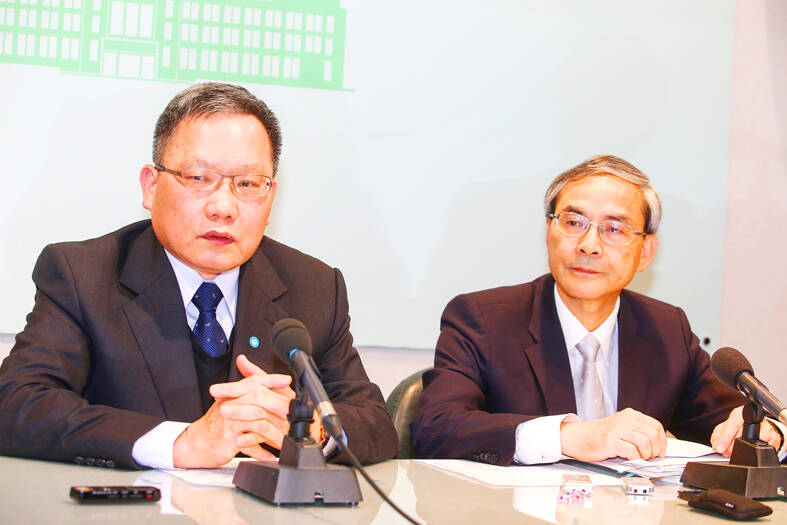Minister of Finance Su Jain-rong (蘇建榮) is to step down from his post on Monday to return to teaching at National Taipei University, Cabinet spokesman Lo Ping-cheng (羅秉成) said yesterday.
Su has tendered his resignation and Premier Su Tseng-chang (蘇貞昌) has approved it, Lo said.
Su Jain-rong has been on leave from his post at the university, where he is a professor in the Department of Public Finance.

Photo: CNA
Deputy Minister of Finance Frank Juan (阮清華) is to take on Su Jain-rong’s duties as acting minister after his departure, Lo added.
During yesterday’s weekly Cabinet meeting, the last one with Su Jain-rong in attendance, Su Tseng-chang praised the outgoing minister for stabilizing the nation’s finances amid a US-China trade dispute, the COVID-19 pandemic, China’s military threats and Russia’s invasion of Ukraine.
The premier said that Su Jain-rong had ensured budget flexibility and sustainability, freed up funds from existing budgetary items, and reduced national debt.
He established a reasonable tax system, cut government expenditure, took measures to deter speculation, introduced tax breaks on remittances from overseas and simplified tax filing procedures, the premier said.
On Su Jain-rong’s watch, the government recorded annual surpluses of more than NT$100 billion (US$3.26 billion) for four consecutive years, and international credit-rating agencies last year raised Taiwan’s credit rating, which are remarkable achievements, he added.
Su Tseng-chang thanked Su Jain-rong for his contributions to the nation and expressed the hope that he would apply his practical experience to foster financial talent among his students.
Separately, Juan said in an interview that he would do his best to stabilize the nation’s finances during a time of economic volatility.
Taiwan’s economy faces challenges such as the US Federal Reserve further raising interest rates, a global economic downturn and sluggish sales, he said.
These challenges have hampered the efficacy of the National Stabilization Fund (NSF), which was activated in July to boost investor confidence, he added.
As the Taiwan Stock Exchange continues to face uncertainties, the fund would continue to support the local equity market next year, said Juan, who is also the executive secretary for the NSF Management Committee.

NEW IDENTITY: Known for its software, India has expanded into hardware, with its semiconductor industry growing from US$38bn in 2023 to US$45bn to US$50bn India on Saturday inaugurated its first semiconductor assembly and test facility, a milestone in the government’s push to reduce dependence on foreign chipmakers and stake a claim in a sector dominated by China. Indian Prime Minister Narendra Modi opened US firm Micron Technology Inc’s semiconductor assembly, test and packaging unit in his home state of Gujarat, hailing the “dawn of a new era” for India’s technology ambitions. “When young Indians look back in the future, they will see this decade as the turning point in our tech future,” Modi told the event, which was broadcast on his YouTube channel. The plant would convert

‘SEISMIC SHIFT’: The researcher forecast there would be about 1.1 billion mobile shipments this year, down from 1.26 billion the prior year and erasing years of gains The global smartphone market is expected to contract 12.9 percent this year due to the unprecedented memorychip shortage, marking “a crisis like no other,” researcher International Data Corp (IDC) said. The new forecast, a dramatic revision down from earlier estimates, gives the latest accounting of the ongoing memory crunch that is affecting every corner of the electronics industry. The demand for advanced memory to power artificial intelligence (AI) tasks has drained global supply until well into next year and jeopardizes the business model of many smartphone makers. IDC forecast about 1.1 billion mobile shipments this year, down from 1.26 billion the prior

People stand in a Pokemon store in Tokyo on Thursday. One of the world highest-grossing franchises is celebrated its 30th anniversary yesterday.

Zimbabwe’s ban on raw lithium exports is forcing Chinese miners to rethink their strategy, speeding up plans to process the metal locally instead of shipping it to China’s vast rechargeable battery industry. The country is Africa’s largest lithium producer and has one of the world’s largest reserves, according to the US Geological Survey (USGS). Zimbabwe already banned the export of lithium ore in 2022 and last year announced it would halt exports of lithium concentrates from January next year. However, on Wednesday it imposed the ban with immediate effect, leaving unclear what the lithium mining sector would do in the